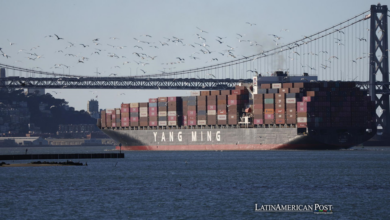China: Imperialism in Africa
Today, the monopoly and control that China has in most countries in the world can replicate the same imperialism that the West exercises today .

Photo: Pixabay
LatinAmerican Post | Santiago Gómez Hernández
Listen to this article
Leer en español: China, el nuevo imperio en África
The current world is the result of colonial and imperialist processes of the Western powers. The borders, the edges, the inequalities have, to a great extent, causes of the imperial past on the planet. Traditionally, these modern empires come from the West: Europe and the United States. However, it has not only been the Western powers that have been the imperial countries. A clear example of the last century was Japan, who, with its empire, managed to conquer and establish a regime in East Asia. Even today, several human rights violations are remembered.
But an empire from the past that is resuming its global influence today is China. Prior to the arrival of European empires in Asia, China was a superpower in the region, establishing an empire feared and respected by its neighbors. But that imperial model of the past seems to be currently being modified with Xi Jinping's China, who today seems to imitate European empires more than Asian empires.
China has positioned itself as a major global power and its influence is not only economic and investment, it is also an important security and cooperation ally.
You can also read: Iran and Saudi Arabia Restore Relations: End of Terrorism in the Region?
The Asians with the largest population in the world have left poverty levels behind and went from being a Third World country to one where the quality of life of its inhabitants exceeds that of many nations in Latin America. Not only is it the largest market in the world, but each time its citizens have a high purchasing power. These changes have also generated an increase in the demand for products from China and, despite its large size, it still needs to import a large amount of materials.
Today, China imports more than 100 billion metals every year, which means 25% of the metal in the world market. For example, since 2003, China has overtaken the United States as the largest consumer of copper. All these materials have to be obtained from abroad, and Africa has always been an excellent supply of natural resources. But China's influence in Africa is not only limited to trading with countries, the expansion of Chinese companies in the African continent has also grown. Today, they are present in the construction of large infrastructure projects, in the extraction of minerals and oil, in the sale of products. China competes with the West and its companies.
China as Empire in Africa
In 2007, Ali ASkouri, president of the Piankhi Research Group, claimed that China has its first colony in Africa: Sudan. The organization denounces the harassment and persecution of 70,000 residents in the area where the Merowe dam was being built. It was also denounced this year that the justice of the Democratic Republic of the Congo ordered Beijing to pay more than 17,000 million dollars for the breach of an infrastructure agreement. According to the Auditor's report, the Chinese state-owned companies Sinohydro Corp and China Railway Group Limited failed to build roads and hospitals that they were supposed to develop by keeping 68% of the participation of Sicomines (mining company).
Similarly, complaints of human rights violations against African workers by Chinese companies is not new. According to LISA News, “China Road & Bridge Corporation had enforced a deliberate segregation policy, in which supervisors in the Asian country repeatedly discriminated against local workers hired for a new railway construction project.”
Chinese expansion has not only been in terms of economics. Since 2017 the first “logistics support center” in Djibouti has already been announced. This, for many, is considered the first international military base of the Asian giant. This base is of vital geostrategic importance, as it guarantees security in the Red Sea and the Gulf of Aden. This area is of great commercial importance due to the Suez Canal and the threat of terrorism and piracy.
Even as China demonstrates an increase in influence, the countries of the mainland must maintain independence and autonomy in order to navigate within the non-alignment. It is necessary to understand that both in the case of China and the West, both options have their benefits and threats. Both are carrying out imperialist processes, despite the fact that the recent past creates greater distrust towards Europe and the United States.




